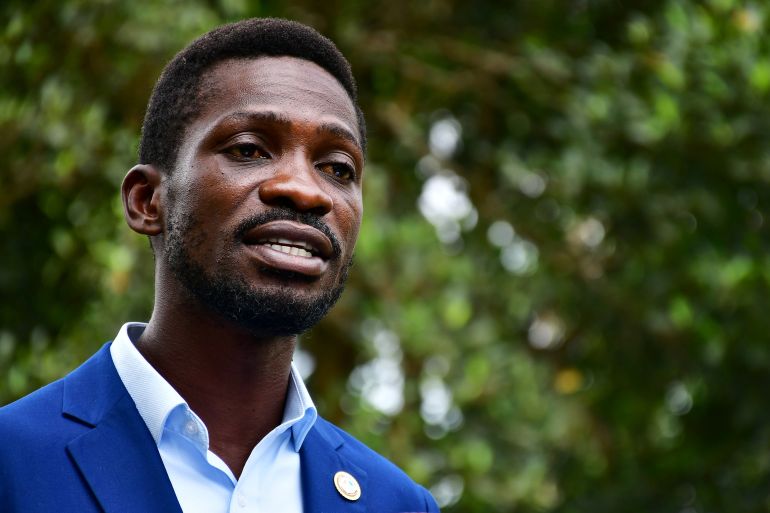Bobi Wine to legally contest Uganda vote, urges non-violence
Uganda’s opposition leader urges supporters to refrain from violence as he plans to challenge President Museveni win in court.

Ugandan opposition candidate Bobi Wine says he will legally contest the results of the presidential election that saw incumbent President Yoweri Museveni announced the winner, asking his supporters to refrain from violence.
Bobi Wine made the announcement on Sunday via the Twitter account belonging to his National Unity Platform (NUP) party, hours after the country’s election commission said Museveni won the vote with 58.6 percent of the vote.
Keep reading
list of 4 itemsWhat’s behind the crackdown on Uganda’s opposition?
#UgandaIsBleeding: Are opposition leaders in danger?
Uganda Decides: Museveni or Bobi Wine?
According to the commission, Bobi Wine secured just 34.8 percent.
Security personnel and police were out in force patrolling the capital Kampala and an internet blackout, ordered by the government the day before the election, was still in place.
“I take this painful but nonetheless inevitable leadership decision of urging you to desist from any form of violence as we prepare to challenge the election outcome and its glaring imperfections through the courts of law for the sake of our long-term victory and for Uganda,” he said.
The decision was taken after consulting with senior NUP leadership figures, Bobi Wine, a pop star-turned-politician whose real name is Robert Kyagulanyi, said.
I therefore take this painful but nonetheless inevitable leadership decision of urging you to desist from any form of violence as we prepare to challenge the election outcome & its glaring imperfections through the courts of law for the sake of our longterm victory & for Uganda
— National Unity Platform (@NUP_Ug) January 16, 2021
Images on state television showed jubilant Museveni supporters in his home district waving flags and cheering, while soldiers in the capital helped marshal motorcycle drivers for a parade – handing them yellow vests and posters of the president.
Jeffrey Smith, founding director of the pro-democracy group Vanguard Africa, said he had been in contact with Bobi Wine.
“Ideally in this circumstance, you’d be speaking to Bobi Wine himself or one of his colleagues, but due to the ongoing internet shutdown in the country and the ongoing restriction of information, obviously you’re unable to do that,” Smith told Al Jazeera.
“I did speak to Bobi earlier, he’s very concerned for his life… The military does remain surrounding his home. They’ve raised their guns at him, they’ve left the front door of his home open, as well as pointing weapons at journalists when they show up. It’s a very concerning situation and it appears to be deteriorating further.”
The army’s deputy spokesman Deo Akiiki said the soldiers were there for Bobi Wine’s “own security”.
‘Show his evidence’
Speaking to Al Jazeera on Saturday, Bobi Wine said the authorities were refusing to allow him to leave his residence and maintained the January 14 election had been rigged in Museveni’s favour.
“He said he had evidence of widespread irregularities,” said Al Jazeera’s Catherine Wambua-Soi, reporting from Kampala. “He did not show his evidence, he said he is going to present his evidence once the internet is back up.”
The 76-year-old Museveni, in power since 1986 and one of Africa’s longest-serving leaders, dismissed the allegations of fraud in an evening address to the nation, saying Thursday’s election may turn out to be the “most cheating-free” in Uganda’s history.
He thanked his supporters and said now “the only thing to avoid is violence”.
The campaign was marked by a deadly crackdown by security forces on Bobi Wine, other opposition candidates and their supporters.
In the run-up to the vote, local civil society groups and foreign governments questioned its credibility and transparency after scores of requests for accreditation to monitor the election were denied.
The United States and an African election-monitoring group complained of election irregularities.
The US Department of State’s top diplomat for Africa, Tibor Nagy, said in a tweet on Saturday the “electoral process has been fundamentally flawed”.
He cited fraud reports, denial of accreditation to observers, violence and harassment of opposition members, and the arrest of civil society activists.
The United Kingdom said it was concerned by the national internet shutdown, adding that it constrained freedoms and “clearly limited the transparency of the elections”.
In a statement, British Minister for Africa James Duddridge also called for an investigation into alleged election irregularities.